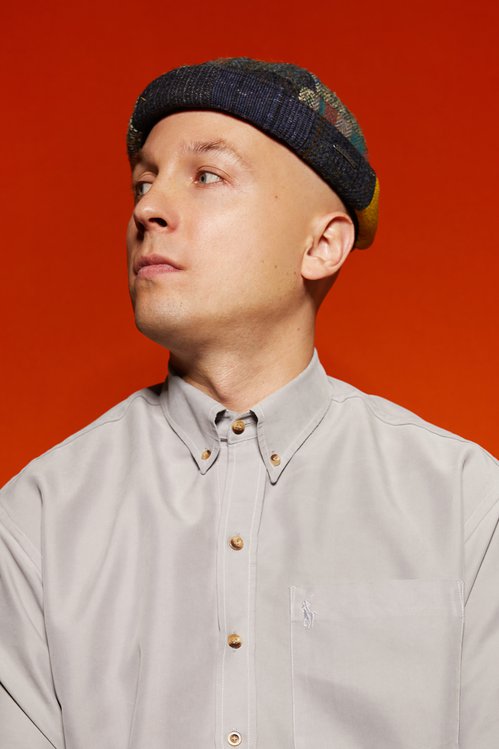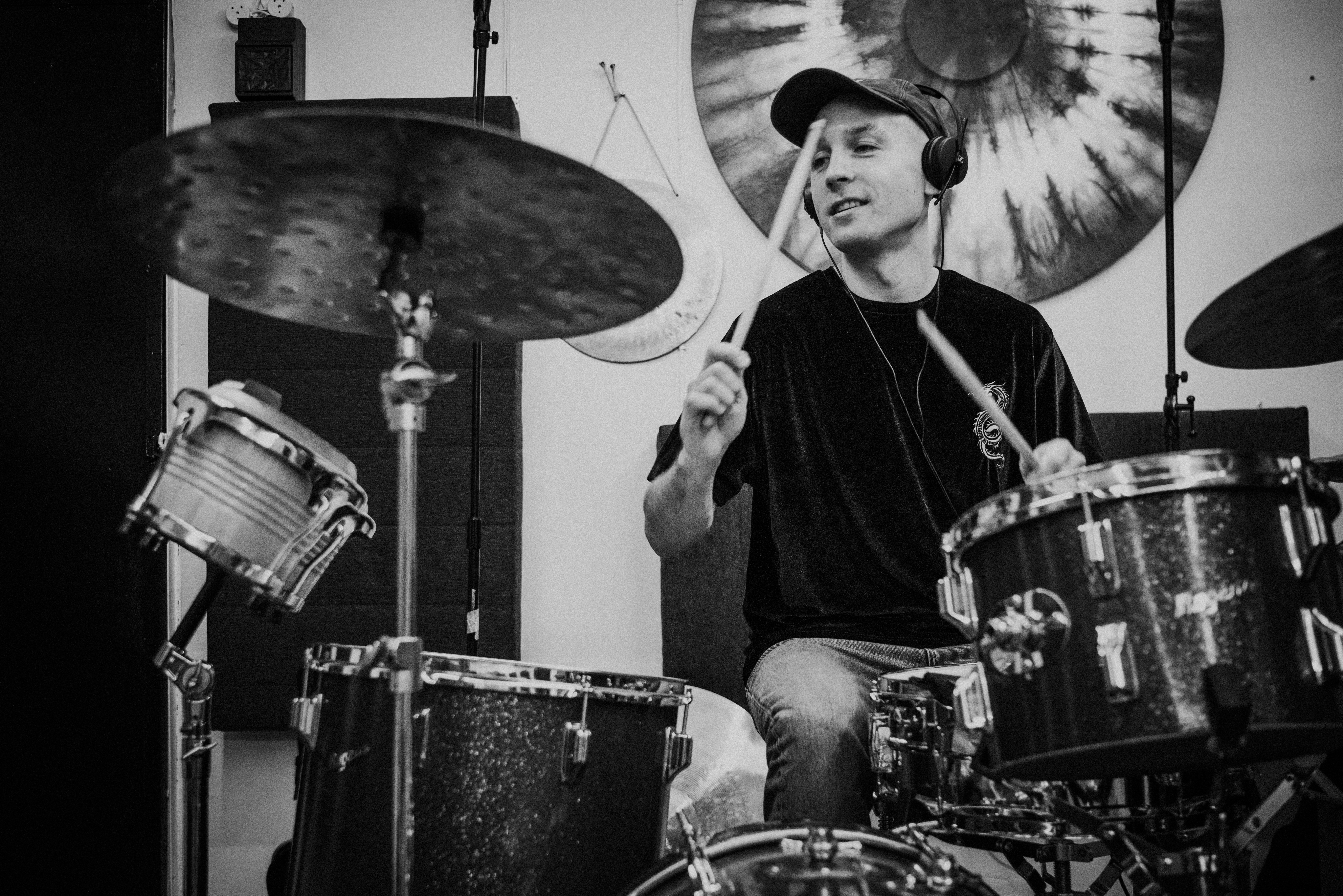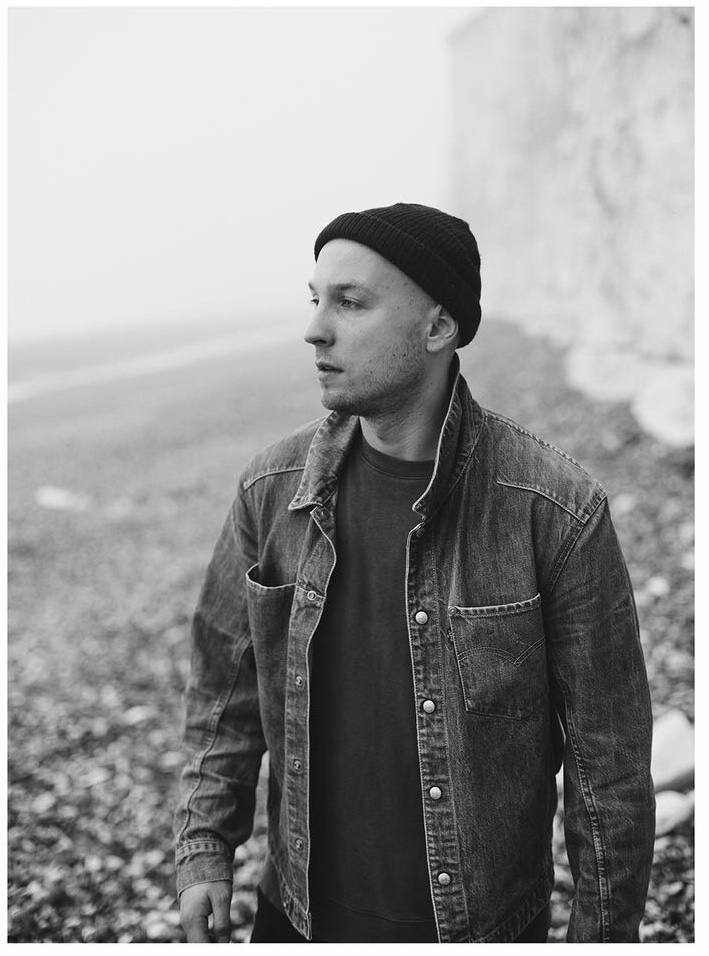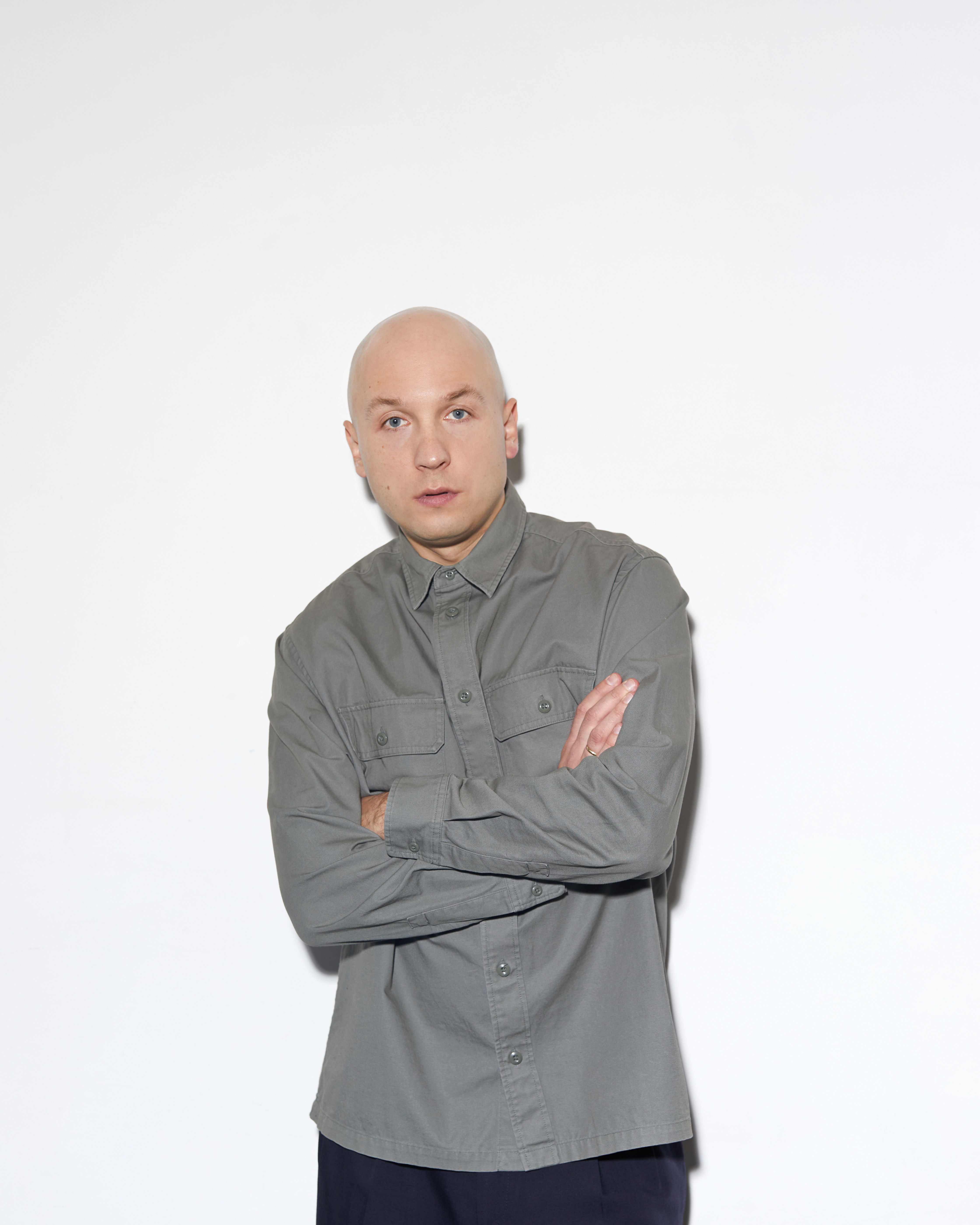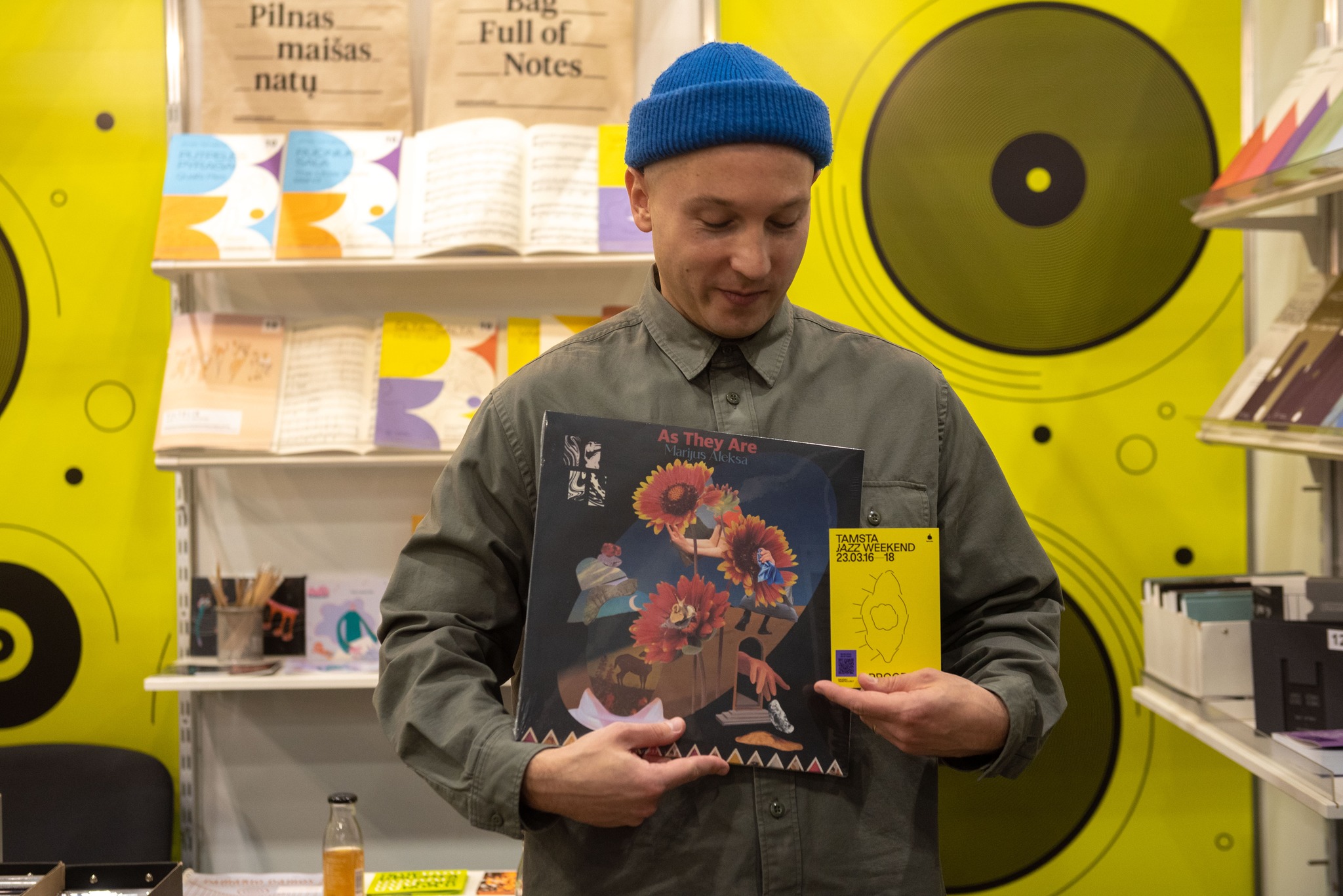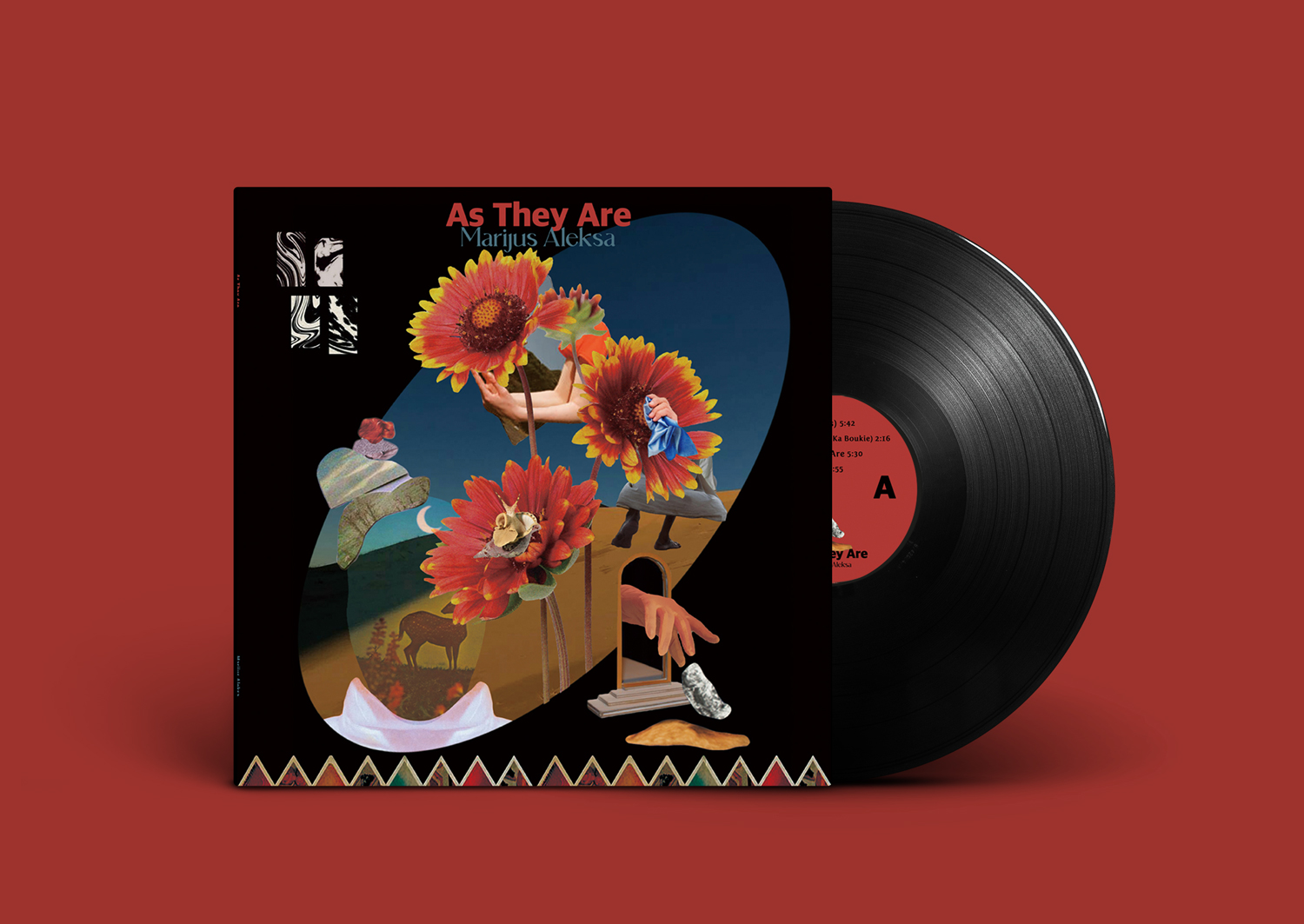Marijus Aleksa – As They Are
- March 15, 2023
Domininkas Kunčinas / Ore.lt
If the drummer Marijus Aleksa had been told 30 years ago that he would be accompanying famous names and performing all over the world, it would have seemed like utopia to the musician from Lithuania. He has achieved all this, but today the musician and producer is looking for his own sound and wants to walk his own path. We met him at the live music club Tamsta on the outskirts of Vilnius Old Town. On 16-18 March, at the Tamsta Jazz Weekend, curated by Marijus himself, he and a dozen musicians will present his new solo album As They Are, a sonic record of his experiences as a session drummer and his transformation into a music maker. After spending ten years in London, he returned to his hometown a few years ago, where he is happy to have finally found peace and... routine.
My first casual acquaintance with Marijus was about 15 years ago when he kept the rhythm of a project called Dublicate. Back then, the Lithuanian scene was already buzzing about this percussion nugget. He then disappeared, only to emerge with renewed vigour on the London new jazz scene. Performances with Keyon Harold, Bill Laurance, Joe Armon Jones, Ashley Henry, Dennis Rollins, China Moses, Ben Marc, Anthony Joseph, Femi Temowo, Oscar Jerome and others have established Aleksa's name amongst the most trusted session musicians.
Long in the shadows of other musicians, drummers have recently come on the radar more and more. In the origins of Lithuanian percussionists we find the legendary jazzman Vladimir Tarasov, who started playing in the late 1970s and was later recognised as one of the best drummers in Europe. Dalius Naujokaitis, a percussionist distilled in New York's avant-garde experimental scene, has rekindled the fire of free jazz in Vilnius. Contemporary drummers Gintautas Gascevičius, Vladas Dieninis, Adas Gecevičius and others are all looking for their unique sound.
Having decided to slowly end his career as a musician-worker, Marijus has lately been shining with creativity. After releasing his debut album Maps in 2018, last year he recorded Music For a Non-Existent Movie with his long-time creative partner Paulius Kilbauskas, and No Rivers Here with the well-known electronic music producer Manfredas, and now he is about to present his solo work As They Are and promises a drum solo album in the autumn.
We are sitting in a cosy little studio next to the club, where he and his Rhythm School students share their drumming techniques and philosophy. At the end of 2022, the first of the Rhythm School concerts took place, where the youngest participant was just five years old. No doubt all of these aspiring drummers will be present at the premiere of their teacher's album As They Are in mid-March, and we start our conversation with a photo of a happy teenager sitting behind a drum kit set up in a living room...
Peanut butter drums
At one point my parents decided to sell their flat, my grandparents and my aunt did the same, and together they bought a house. I grew up in [Vilnius suburb] Naujininkai until I was 10, and then we moved to [more distant suburb] Naujoji Vilnia.
My family is very musical. My mother graduated from the Lithuanian Academy of Music and Theatre, worked as a researcher at the M.K.Čiurlionis Museum in Kaunas, as a piano teacher at the B.Dvarionas School in Vilnius, and later became a music therapist - she taught, founded the Lithuanian Music Therapy Association, and developed university programmes, making her one of the pioneers of music therapy in Lithuania. My father has a PhD in physics, but for a while he played bass and wrote the lyrics for the rock band Veidrodis. In those days, there was a Culture Train that travelled around the Tiumenė region [in Siberia] for a month, introducing Lithuanian culture. My father went with Veidrodis and my mother went to introduce M.K.Čiurlionis. A train carriage full of all kinds of cultural people. It was on that train that mum and dad met. In addition, her sister played bass in a band called Sexual Giant from Jonava. My aunt later gave that bass to my brother Domantas, who I still play and compose with.
Later, my father stopped playing rock music as he devoted all his time to science, but at home he would play acoustic guitar and write us all kinds of songs. I don't know where the drums came from or why, but from the age of five I started playing... At that time, relatives from America used to send parcels to Lithuania with huge jars of peanut butter. Each jar would become my drum. I played them for a while. We were not very well off, so my mother's colleague, a therapist from Norway, gave me money to buy my first real drums. From then on, my brother and I started rehearsing at home.
Rhythm community in London and Rhythm School in Vilnius
I’m a graduate of the Kelpša [Vilnius Juozas Tallat-Kelpša Conservatoire]. Later I entered the Lithuanian Academy of Music and Theatre, but I went to Germany for Erasmus studies. I came back to Lithuania for a short time, went to London and didn't study anywhere else. My studies were replaced by jam sessions in London, and then I became a member of a house band in several music clubs.
I used to often visit shed sessions organised by black gospel drummers in local churches. A few dozen drummers would gather there and jam together. Often other musicians would come to play and the next day they would perform with celebrated artists in arenas for thousands of people. There was a very strong sense of community. I was just observing and learning. Slowly, from all these different experiences a kind of methodology emerged, which I use today in my lessons, and I can see how it works.
Four years ago, when I returned to Lithuania, I started teaching drums. At first, it was professionals and more experienced people, and then the ages got younger. My youngest student is five years old and the average age is about 12, and there are girls too. It's nice that the drums are no longer seen as a “macho” instrument.
Passing on experience is a never-ending road. We play during the lessons, and if we get bored we switch to modular synths, compose, record and produce - I would like to teach the way music is “made” today. In Lithuania, regular music schools have a strict curriculum, so every child is being taught in a similar way. I think you can’t teach and evaluate everybody in the same way, especially when it comes to creative studies. Sometimes kids come in who, at first glance, may not seem to have a receptivity to music or rhythm. But if you find the right approach and contact, it’s not long before these children start to play even more interestingly than the others.
Musical distraction and self-monitoring
As a session musician, I have been in a musical compromise for a long time - the further you go, the less you want it. Over time, I started to realise how much I’d like to compose myself. I felt like a kind of tourist on other people’s journeys. Some people go on being session musicians all their lives, and I realised I didn’t want to anymore because I feel kind of fake.
Coming back to Lithuania and being quarantined was a very good thing. I didn't have to travel so much, I had more time to focus on my creative process. Later, Radio Vilnius invited me to do a monthly show. Now I realise that it became a very good self-examination for me. I play what I really like on the show. I put this music on my Spotify account and feel that a common musical field is being formed. Half of my activity now is teaching and the rest of the time I spend in the studio, finding my sound.
I played a lot with very different musicians, firstly one kind of music with Paulius Kilbauskas, then in London another kind, with Anthony Joseph, where I played world music and tried a lot of pop and jazz and even had a rock band called Cortes. But then I started to get annoyed with the distraction between so many styles. After all that, it takes a while to realise who you are. It's very important not to get caught up by the initial banal inspiration. This often happens to young artists: they hear something and are so inspired by it that they unconsciously become copies of what they heard.
I realise that I'm quite old, but I don't have a pop orientation so age is not relevant. One of my favourites, maybe even my favourite artist, Jon Hassell [pointing at a photo on the studio wall], released his first album at 40 and played until his death at 80.
A new Lithuanian sound and (un)scheduled time
I discuss with my older students, 17-18-year-olds who play in cool indie bands, that maybe there will finally be more self-discovery in Lithuanian music. At the beginning of Lithuanian independence, when there was no internet and when no one could go abroad or come here, it was enough to make it "like abroad" and it was new and great for everyone. There was no understanding that if you wanted to be interesting to the world you have to look for what's here, who you are, and not be afraid of it, not be ashamed of yourself. It seems like, how can you be cool, being from Lithuania?
When I finished school I didn't have a routine, I started my life as a musician right away, and in recent years I know very clearly that on weekdays I teach children from a certain hour, the rest of the time I spend in the studio, and in the evenings and at weekends I rest and do nothing. Except for the occasional concert. I've arranged everything in such a way that there is a time when nothing is planned, and now I enjoy harmony and good rhythm. I like the fact that in Vilnius, unlike in London, you can afford to go to the theatre or the opera. Both timewise and moneywise.
I may even close down my session drummer activities altogether, although I'm still invited - I'll be going on a European tour with the pianist Bill Laurance (20 April - 14 May), doing a workshop in Brazil, and playing at a few festivals (9-18 June). I would like to finally be invited not to perform someone else's music professionally, but for my own style and music. This is how I would like to project my future career.
Making music in fashion and percussion at Paris Fashion Week
Fashion design is, in principle, an interesting thing. In the visual arts, as in music, craftsmanship and concept are very important. It's not interesting if it's all concept or all craftsmanship. Another very important thing you can't do without is taste, where you just feel what's right and what's not right. I don't look at fashion as some kind of empty pretentiousness; if you know how to dress nicely, it's just creativity. And it doesn't need a lot of money. A rich person can dress so tastelessly that... 18-20-year-olds in Vilnius look more daring and creative.
In November, I got an email from Hiromi, probably the most famous classical and jazz pianist in Japan: “Hi, I'm Hiromi. My husband Mihara Yasuhiro, a fashion designer, is going to be at Paris Fashion Week, would you like to play a drum solo at his collection presentation?” At first, I couldn't believe it was the same Hiromi. It turns out that I’d been recommended by an acquaintance in London who knew I was recording a solo album. And Mihara Yasuhiro has used percussion in more than one presentation of his collections.
There was a time I used to listen to Vladimir Tarasov's Atto solo albums and wondered why I was always looking for new ways of performing. After all, I’ve been playing drums for over 30 years - I should try to make a drum solo. I went to the studio for about three months straight and worked on it. Last summer I recorded my drum solo album, it should be out this autumn. So that's how I played drums at Paris Fashion Week.
Traditions and a white sheet of paper
Back in Lithuania, I started thinking about my roots. I played with musicians from Nigeria or Trinidad, and they actually still listen to their folk music, which is what their grandparents listened to. They are driven by it, while we don't listen to our folklore every day, we don't live it. Maybe sometimes we listen to traditional songs, trying to understand our identity. You can’t squeeze out what’s not there. On the one hand, we have a slightly harder road, because we have to dig deep to find ourselves, but then again it's good that we have... a blank sheet of paper. There are two camps of musicians in the world. The first stick to traditions and are proud of it, and there’s a very strong “respect the ancestors” line in the jazz scene, the social and political links. The other musicians are constantly searching for a sound, mixing different traditions, and trying new tools and techniques. I think the second option is more suitable for us. Although... let's say Merope with Indrė Jurgelevičiūtė are interesting to the whole world. I used to be coursemates with her and she always liked it. Indre lived it and you can hear it. It’s real.
I'm more interested in a clean slate, maybe that's why I use more electronics. Hip-hop, jazz, rock, Latin music and other genres have their clear roots, but electronic music has emerged not from a region but from technological progress. Given that jazz was once very innovative and progressive, for me jazz today is electronic music as the most searching and changing music.
As They Are
What you often hear on an album is not what the artists are today but where they were a few years ago. In my case, composing and recording took about a year, then there was the pandemic, and then the publishing stuff. As They Are is a sonic "snapshot" of that time, a closure of a certain phase of mine, of my experiences as a session musician. A transition album from musician-worker to musician-creator. Over the last 10-15 years I’ve played with various musicians. There was a phase with the poet Anthony Joseph [who was awarded the T.S.Eliot Prize this year for Sonnets for Albert] during which I got a good feel for Caribbean rhythms. With Femi Temowo from Nigeria, I got into Afrobeat for a few years. I also played with new jazz artists like Joe Armon Jones, Ashley Henry and others. I've always been interested in electronic music, ever since Dublicate when I was 19. I recently started collecting drum machines, samplers, modular synthesisers and other "electronics". Playing with different musicians, I picked up things I liked from them: rhythm from one, from another I realised I just liked the organ, from another I got hooked on bass clarinet and flutes, from yet another I discovered some African drums, electronic sounds and sequencers. A collage of these influences came together in my head, and the way some musicians play contributed to it.
The album started with one jam. During the lockdown, when travel was briefly allowed, my pianist friend Sam Crow flew to Vilnius from London to record an album for his band Native Dancer. We did it all in a few days and had some spare time. I called Paulius and told him that a very nice keyboard player had arrived. He came over with all his "devil machines". Starved by the prolonged quarantine, we played for six hours, recording everything. After a while I opened the file in the studio - I listened, there's a pearl, there's a pearl, I cut something out. You know, it's like cutting down a tree, pruning it, scrapping, scrapping, and seeing if maybe I should put in some colour there. You send a sound sketch and you ask, could you record a part? For example, the Cuban Yelfris Valdés recorded the trumpet part. That's how the melodies came about little by little. First I cut that recording session, and then I made a collage. As many as 23 musicians were involved in the recording of the album.
I didn't have any musical vision when I started, all was happening in the as-you-go principle. Having a good framework, I wrote some of the tunes myself. But I realised that for the next album I’d like to come up with everything on my own, even the smallest details, and during that time develop my taste even more. As They Are kind of carried itself in a way: I steered the boat a little bit, but it still sailed with the wind. If I’d done everything myself, it would have just been what was in my head, whereas here I kept passing the ball to someone else and they coloured it in a way I might not have done myself. On the other hand, there were some interesting surprises - for example, sometimes light would appear in an initially dark piece. I didn't want to “scalp” the musicians, so that's why the title is As They Are. I want to bring out the best qualities of the musicians or their bands.
AS THEY ARE
Marijus Aleksa - drums, synths & drum machines, production
Domas Aleksa - bass
Junior Alli Balogun - percussion
Arminas Bižys - alto sax
Ka Boukie - vocals
Samuel Crow - keys
Nathaniel Facey - alto sax
Will Fry - percussion
Jonathan Harvey - upright bass
Kazimieras Jušinskas - soprano sax
Simonas Kaupinis - tuba
Paulius Kilbauskas - electronics
Alex Losardo - electric guitar
Gediminas Mačiulskis - percussion & balafon
Danielius Pancerovas - tenor sax
Remigijus Rančys - flute
Oli Rockberger - keys
Dovydas Stalmokas - baritone sax
Domas Strupinskas - sampler
Mindaugas Vadoklis - trumpet
Yelfris Valdés - trumpet
Paulius Vaškas - electric guitar
Josiah Woodson - flute
Produced by Marijus Aleksa
Recorded by Pranas Gudaitis
Mixed by Jonas Drema
Mastered by Keith at Curve Pusher
Artwork and design by Mt. Chills
Portrait photo by Monika Penkutė
Released by Music Information Centre Lithuania
Distributed by The state51 Conspiracy
Supported by Lithuanian Council for Culture and Lithuanian Neighbouring Rights Association (AGATA).
Vinyls and digital albums are avialable here or at MusicLithuania.com.
